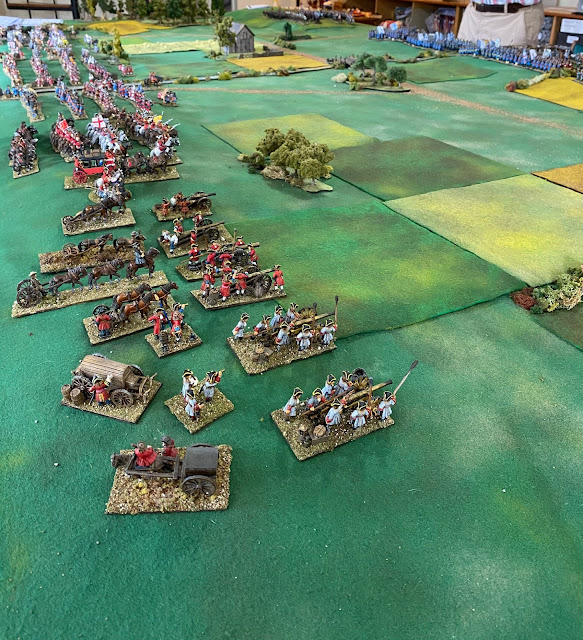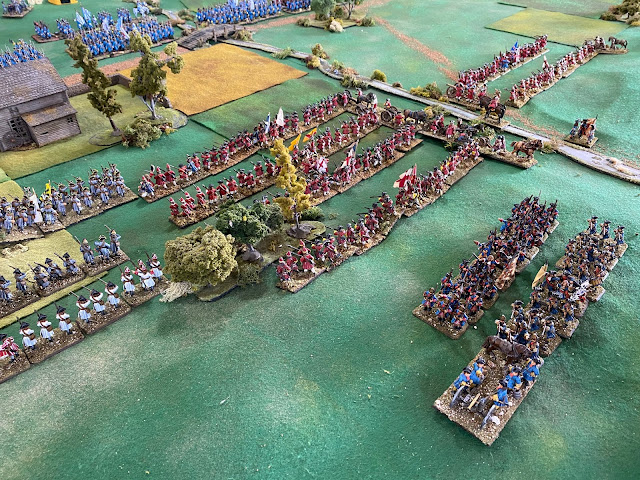Yesterday on a very humid summer’s day nine of us, eight players and an umpire, gathered around a large table in West Auckland to play a War of Spanish Succession wargame. For my sins the umpire made me Marlborough and commander of the Allied army. After lecturing my subordinates how they must refer to me as “Your Grace” I set up my plan.
The table was bisected by a shallow stream that ran east-west. A large wood lay on the southern end of the field and a village on northern end. Believing that there was an opportunity to control the north end of the field with artillery, supported by a portion of the main army and the reserve, I decided to strike south of the stream with the bulk of the army. The deployment was as below.
Sadly the enemy was not as obliging at I thought they might be and they held the bulk of their force North of the stream, holding only a brigade of Bavarians and most of their cavalry to the south.
And so the game began.
The view up the table from the south with our glorious forces on the right.
Eugene’s Austrian infantry, supported by the Austrian brigade from Lumley’s cavalry.
Looking south along the Allied line.
The action started on out left as the Austrian infantry moved forward keeping a solid front against the Franco-Bavarian cavalry. The cavalry tried to smash through the Austrians, but only succeeded in pushing back a battalion of infantry for a heavy loss.
At the same time the Anglo-Dutch moved forward against the Bavarians.
But as the British advanced north of the stream the French infantry moved to the attack. Although raked by the Anglo-Dutch artillery, the French got the jump of the Foot Guards and stopped them dead, but were not driven and the French attack stalled.
The French then found themselves trapped in a vortex of musketry and artillery fire and collapsed.
Finally the Anglo-dutch reserve force arrived, exactly the same time that the French reserve arrived, and almost exactly opposite each other.
The two reserve cavalry forces shaped up against each other and my Dutch troopers got the jump of the French and charged one regiment in the flank. Despite having all the advantages in my favour the dice Gods were not kind to Anglo-Dutch arms and the French didn’t break - instead they turned to face in the second round of the fight and drove my boys off, taking with them another regiment of cavalry and a couple of guns. Thankfully the Swiss infantry, in Austrian service, held their own and repelled the cavalry.
Lumley’s horse then entered the fray and was perfectly poised to sweep the field...but its first attempt was an abysmal failure thanks to rolling a “1”. A second attempt was more successful and the French cavalry were driven off, although Lumley’s force was largely destroyed in the process.
In the centre the Austrians and British infantry slowly pummeled the Bavarians and after an extended fight the Bavarians decided they had had enough and quit field. On the far left the French cavalry continued to try to smash through the Austrian infantry, but despite some minor success could not drive the infantry off.
By now both sides were fought out and an end was called. The Allied forces had an edge, but not a decisive one. Both sides claimed victory.
For another view of the same action, see Keith’s (Eugene’s) report here with a lot more pictures than Ibtook.










Very handsome game, Mark! WSS is period that has tempted me for years, Your battle account is not helping my restraint.
ReplyDeleteThank you Jonathan. I have the same problem when you present your 1859 armies. The saving grave there is that there is 28mm manufacturer whose figures I like.
DeleteLovely looking game and your Churchill of course your going to say you won(even if you didn't!)
ReplyDeleteBest Iain
I reminded them at great length that my title was “Duke” not “Duck” or “canard”. It all fell on deaf ears of course.
DeleteGreat looking game with plenty of troops. Lovely :)
ReplyDeleteThank you...there were one or two figures on the table!
DeleteExcellent looking game! Glad to see the WSS masses on the table your Grace! :)
ReplyDeleteThanks Mark and indeed “your grace” its the correct term...royal protocol specifies that only a duke or higher rank can call a duke “Duke”. It was nice to see the Bavarians out of their boxes and on the table, although I didn’t get to command them.
DeleteLots of lovely figures and nicely formed lines. Great stuff. Did they make you wear the wig?
ReplyDeleteToo hot for the wig and I deliberately left the snuff box behind lest my sneezing got me locked in quarantine for Corona Virus. It us tpstifling here today...you woul remember Auckland in Feb...temperatures only in the high 20’s C but humidity 90%+
DeleteI do remember those days, but would gladly trade a Brisbane summer for the Auckland version. The weather here today was however very good; low humidity and a top of 28. Perfect painting weather but I had to spend the morning house hunting with daughter number one.
DeleteWe were peaking in the low 30s last week, but it is cooler this weekend and the first rain in 45 days. Just got back from a weekend away in Rotorua...the whole of the countryside between here and there is so dry it is beige...the little bit of rain we have had will not fix that.
DeleteNice report Mark and thanks for the free advertising! The protocol of address is interesting...a similar situation around rank exists in the army ( there is only one REAL army!) whereby an officer will address a Sergeant Major as Sarnt Major...but non commissioned ranks must call him Sir....unless they are from the SAS, then they just call him Sarnt Major too and watch him turn purple with rage!
ReplyDeleteWell you took more pics than me, and more up your end of the table too.
DeleteSeemed like a bit of a brutal encounter. Was the lack of a decisive result down to the dice or the generalship?
ReplyDeleteIf we went by count of surviving effective units the Allied forces would have won - by my count we had about 16 while they had about 12.
Delete